3、系动词Be(am, is, are)的用法
- 格式:doc
- 大小:46.50 KB
- 文档页数:4
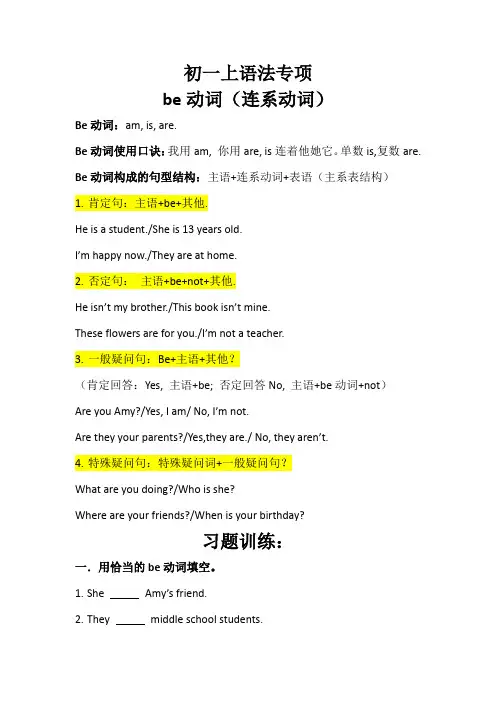
初一上语法专项be动词(连系动词)Be动词:am, is, are.Be动词使用口诀:我用am, 你用are, is连着他她它。
单数is,复数are. Be动词构成的句型结构:主语+连系动词+表语(主系表结构)1.肯定句:主语+be+其他.He is a student./She is 13 years old.I’m happy now./They are at home.2.否定句:主语+be+not+其他.He isn’t my brother./This book isn’t mine.These flowers are for you./I’m not a teacher.3.一般疑问句:Be+主语+其他?(肯定回答:Yes, 主语+be; 否定回答No, 主语+be动词+not)Are you Amy?/Yes, I am/ No, I’m not.Are they your parents?/Yes,they are./ No, they aren’t.4.特殊疑问句:特殊疑问词+一般疑问句?What are you doing?/Who is she?Where are your friends?/When is your birthday?习题训练:一.用恰当的be动词填空。
1.She Amy’s friend.2.They middle school students.3.he a student?4.What is his name?5.Who the girls under the tree?6.I in Class 4.7.My school very big.8.It my dog Coco.9.My parents in the living room.10.Jack and Bob smart boys.二.单选题。
()1. These my family.A.amB.isC.areD. be()2. He my brother and she my sister. A.am; is B.is;is C.are;am D. be;is()3. There a cup on the desk.A.amB.isC.areD. be()4. Here a photo of my family.A.amB.isC.areD. be()5. I 2 years old.A.amB.isC.areD. be()6. That a red pen.A.amB.isC.areD. be()7. ——Who you?——I Sarah.A.am;areB.is; isC.are; amD. be; are()8. My sister 4 years old.A.amB.isC.areD. be()9. What this in English?A.amB.isC.areD. be()10. It a yellow jacket.A.amB.isC.areD. be三.用be动词补全短文。
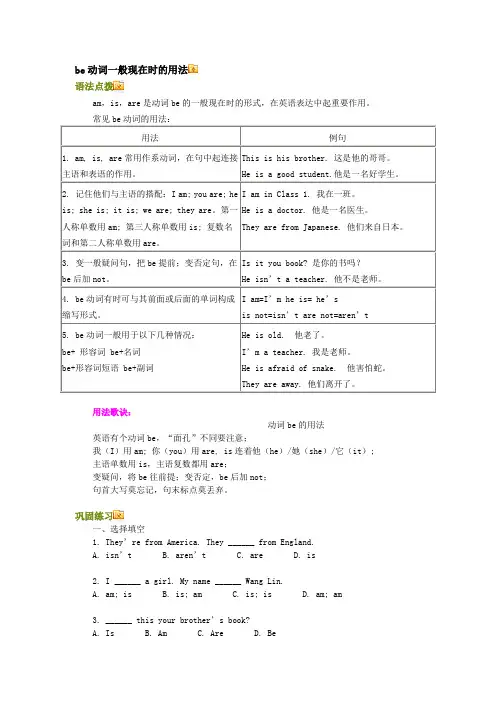
be动词一般现在时的用法语法点拨am ,is,are是动词be的一般现在时的形式,在英语表达中起重要作用。
常见be动词的用法:用法歌诀:动词be的用法英语有个动词be,“面孔”不同要注意;我(I)用am; 你(you)用are, is连着他(he)/她(she)/它(it);主语单数用is,主语复数都用are;变疑问,将be往前提;变否定,be后加not;句首大写莫忘记,句末标点莫丢弃。
巩固练习一、选择填空1. They’re from America. They ______ from England.A. isn’tB. aren’tC. areD. is2. I ______ a girl. My name ______ Wang Lin.A. am; isB. is; amC. is; isD. am; am3. ______ this your brother’s book?A. IsB. AmC. AreD. Be4. Daming and Lingling ______ good students.A. isB. areC. isn’tD. am not5. Their names ______ Lily and Kate.A. isB. areC. amD. be二、用am/is/are填空1. — What ______ your name?— My name ______ George.2. Her name ______ Hu Li.3. — What ______ this in English?— It ______ a key.4. — What color ______ it?— It ______ red.5. — Hi! How ______ you?— I ______ fine, thank you. And you?— I ______ fine, too.答案与解析一、选择填空1. B。
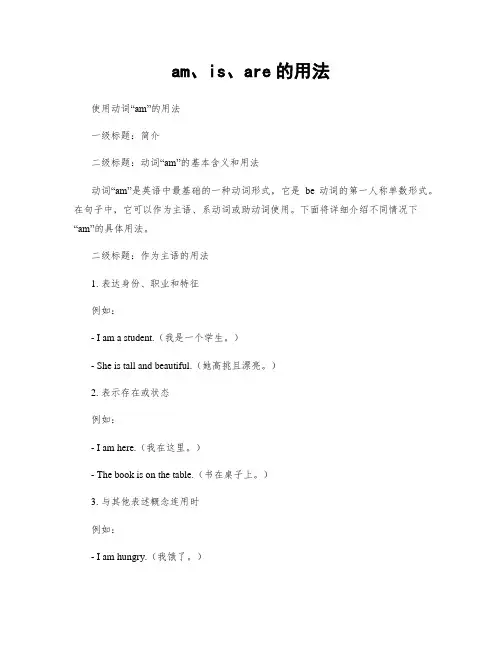
am、is、are的用法使用动词“am”的用法一级标题:简介二级标题:动词“am”的基本含义和用法动词“am”是英语中最基础的一种动词形式,它是be动词的第一人称单数形式。
在句子中,它可以作为主语、系动词或助动词使用。
下面将详细介绍不同情况下“am”的具体用法。
二级标题:作为主语的用法1. 表达身份、职业和特征例如:- I am a student.(我是一个学生。
)- She is tall and beautiful.(她高挑且漂亮。
)2. 表示存在或状态例如:- I am here.(我在这里。
)- The book is on the table.(书在桌子上。
)3. 与其他表述概念连用时例如:- I am hungry.(我饿了。
)- He is tired after working all day.(他工作了一整天,感到疲倦。
)4. 进行对比和对照例如:- This car is expensive, but that one is cheap.(这辆车很贵,但那辆很便宜。
)- It's not as easy as you think it is.(这并不像你想象的那么容易。
)二级标题:作为系动词的用法1. 表示属性、状态和感觉例如:- I am happy.(我很开心。
)- The man is old.(这个人年纪大了。
)- She is tired.(她很累了。
)2. 与形容词连用,修饰主语例如:- She is beautiful.(她很漂亮。
)- The weather is nice today.(今天的天气很好。
)3. 可以搭配现在分词形式表示变化或发展例如:- He is getting better at playing the piano.(他的钢琴水平越来越好。
)- The situation is becoming more complicated.(情况变得更加复杂了。
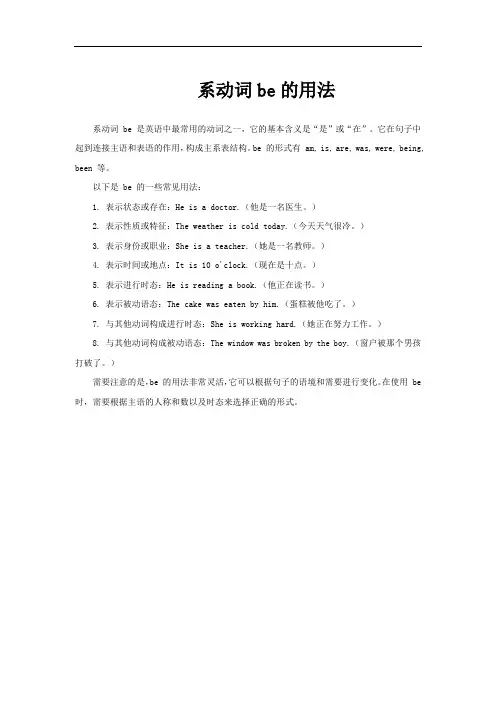
系动词be的用法
系动词 be 是英语中最常用的动词之一,它的基本含义是“是”或“在”。
它在句子中起到连接主语和表语的作用,构成主系表结构。
be 的形式有 am, is, are, was, were, being, been 等。
以下是 be 的一些常见用法:
1. 表示状态或存在:He is a doctor.(他是一名医生。
)
2. 表示性质或特征:The weather is cold today.(今天天气很冷。
)
3. 表示身份或职业:She is a teacher.(她是一名教师。
)
4. 表示时间或地点:It is 10 o'clock.(现在是十点。
)
5. 表示进行时态:He is reading a book.(他正在读书。
)
6. 表示被动语态:The cake was eaten by him.(蛋糕被他吃了。
)
7. 与其他动词构成进行时态:She is working hard.(她正在努力工作。
)
8. 与其他动词构成被动语态:The window was broken by the boy.(窗户被那个男孩打破了。
)
需要注意的是,be 的用法非常灵活,它可以根据句子的语境和需要进行变化。
在使用 be 时,需要根据主语的人称和数以及时态来选择正确的形式。
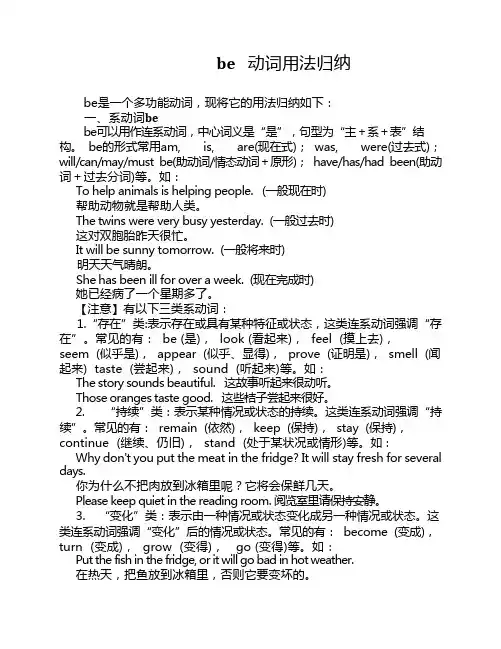
be动词用法归纳be是一个多功能动词,现将它的用法归纳如下:一、系动词bebe可以用作连系动词,中心词义是“是”,句型为“主+系+表”结构。
be的形式常用am, is, are(现在式); was, were(过去式);will/can/may/must be(助动词/情态动词+原形); have/has/had been(助动词+过去分词)等。
如:To help animals is helping people. (一般现在时)帮助动物就是帮助人类。
The twins were very busy yesterday. (一般过去时)这对双胞胎昨天很忙。
It will be sunny tomorrow. (一般将来时)明天天气晴朗。
She has been ill for over a week. (现在完成时)她已经病了一个星期多了。
【注意】有以下三类系动词:1.“存在”类:表示存在或具有某种特征或状态,这类连系动词强调“存在”。
常见的有: be (是), look (看起来), feel (摸上去),seem (似乎是), appear (似乎、显得), prove (证明是), smell (闻起来) taste (尝起来), sound (听起来)等。
如:The story sounds beautiful. 这故事听起来很动听。
Those oranges taste good. 这些桔子尝起来很好。
2. “持续”类:表示某种情况或状态的持续。
这类连系动词强调“持续”。
常见的有: remain (依然), keep (保持), stay (保持),continue (继续、仍旧), stand (处于某状况或情形)等。
如 : Why don't you put the meat in the fridge? It will stay fresh for several days.你为什么不把肉放到冰箱里呢?它将会保鲜几天。
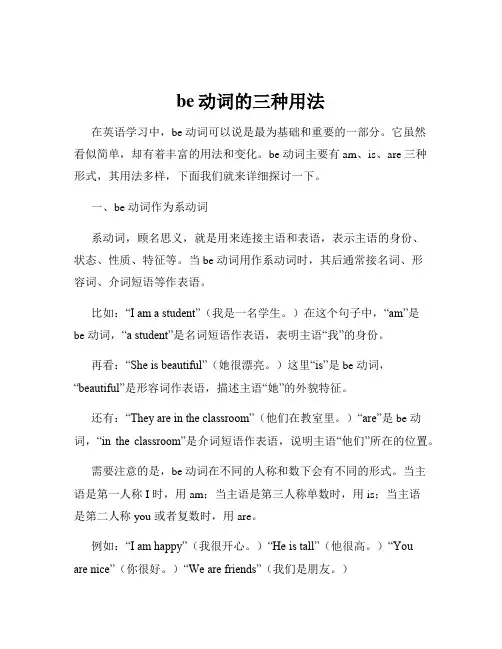
be动词的三种用法在英语学习中,be 动词可以说是最为基础和重要的一部分。
它虽然看似简单,却有着丰富的用法和变化。
be 动词主要有 am、is、are 三种形式,其用法多样,下面我们就来详细探讨一下。
一、be 动词作为系动词系动词,顾名思义,就是用来连接主语和表语,表示主语的身份、状态、性质、特征等。
当 be 动词用作系动词时,其后通常接名词、形容词、介词短语等作表语。
比如:“I am a student”(我是一名学生。
)在这个句子中,“am”是be 动词,“a student”是名词短语作表语,表明主语“我”的身份。
再看:“She is beautiful”(她很漂亮。
)这里“is”是 be 动词,“beautiful”是形容词作表语,描述主语“她”的外貌特征。
还有:“They are in the classroom”(他们在教室里。
)“are”是 be 动词,“in the classroom”是介词短语作表语,说明主语“他们”所在的位置。
需要注意的是,be 动词在不同的人称和数下会有不同的形式。
当主语是第一人称 I 时,用 am;当主语是第三人称单数时,用 is;当主语是第二人称 you 或者复数时,用 are。
例如:“I am happy”(我很开心。
)“He is tall”(他很高。
)“Youare nice”(你很好。
)“We are friends”(我们是朋友。
)二、be 动词用于进行时态be 动词与现在分词(动词的 ing 形式)一起构成进行时态,表示正在进行的动作。
现在进行时的构成是“be 动词+现在分词”。
例如:“I am reading a book”(我正在读一本书。
)“She is singing a song”(她正在唱歌。
)“They are playing football”(他们正在踢足球。
)过去进行时的构成是“was/were +现在分词”。
比如:“I was watching TV at that time”(那时我正在看电视。
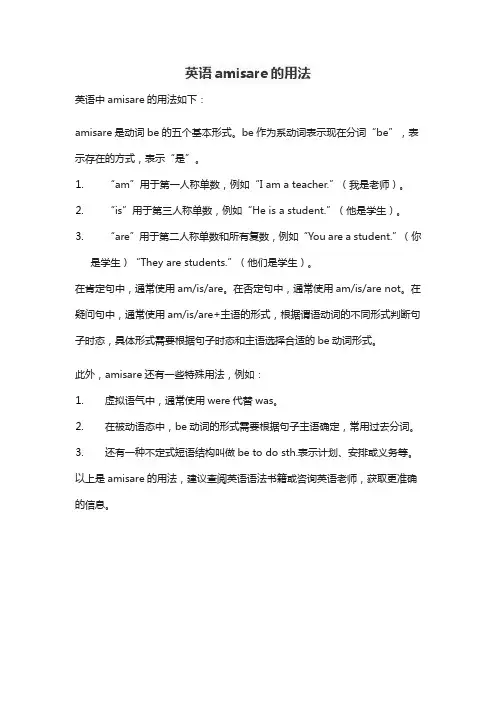
英语amisare的用法
英语中amisare的用法如下:
amisare是动词be的五个基本形式。
be作为系动词表示现在分词“be”,表示存在的方式,表示“是”。
1.“am”用于第一人称单数,例如“I am a teacher.”(我是老师)。
2.“is”用于第三人称单数,例如“He is a student.”(他是学生)。
3.“are”用于第二人称单数和所有复数,例如“You are a student.”(你
是学生)“They are students.”(他们是学生)。
在肯定句中,通常使用am/is/are。
在否定句中,通常使用am/is/are not。
在疑问句中,通常使用am/is/are+主语的形式,根据谓语动词的不同形式判断句子时态,具体形式需要根据句子时态和主语选择合适的be动词形式。
此外,amisare还有一些特殊用法,例如:
1.虚拟语气中,通常使用were代替was。
2.在被动语态中,be动词的形式需要根据句子主语确定,常用过去分词。
3.还有一种不定式短语结构叫做be to do sth.表示计划、安排或义务等。
以上是amisare的用法,建议查阅英语语法书籍或咨询英语老师,获取更准确的信息。
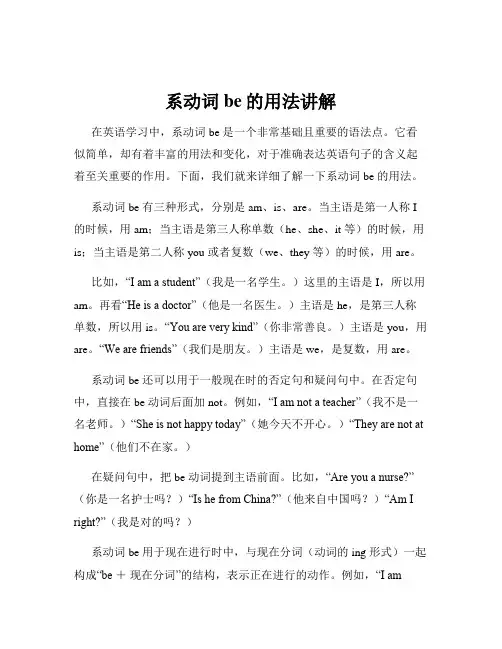
系动词be的用法讲解在英语学习中,系动词 be 是一个非常基础且重要的语法点。
它看似简单,却有着丰富的用法和变化,对于准确表达英语句子的含义起着至关重要的作用。
下面,我们就来详细了解一下系动词 be 的用法。
系动词 be 有三种形式,分别是 am、is、are。
当主语是第一人称 I 的时候,用 am;当主语是第三人称单数(he、she、it 等)的时候,用is;当主语是第二人称 you 或者复数(we、they 等)的时候,用 are。
比如,“I am a student”(我是一名学生。
)这里的主语是 I,所以用am。
再看“He is a doctor”(他是一名医生。
)主语是 he,是第三人称单数,所以用 is。
“You are very kind”(你非常善良。
)主语是 you,用are。
“We are friends”(我们是朋友。
)主语是 we,是复数,用 are。
系动词 be 还可以用于一般现在时的否定句和疑问句中。
在否定句中,直接在 be 动词后面加 not。
例如,“I am not a teacher”(我不是一名老师。
)“She is not happy today”(她今天不开心。
)“They are not at home”(他们不在家。
)在疑问句中,把 be 动词提到主语前面。
比如,“Are you a nurse?”(你是一名护士吗?)“Is he from China?”(他来自中国吗?)“Am I right?”(我是对的吗?)系动词 be 用于现在进行时中,与现在分词(动词的 ing 形式)一起构成“be +现在分词”的结构,表示正在进行的动作。
例如,“I amreading a book”(我正在读一本书。
)“She is singing a song”(她正在唱歌。
)“They are playing football”(他们正在踢足球。
)除了一般现在时和现在进行时,系动词 be 在一般过去时中也有相应的形式,分别是 was 和 were。
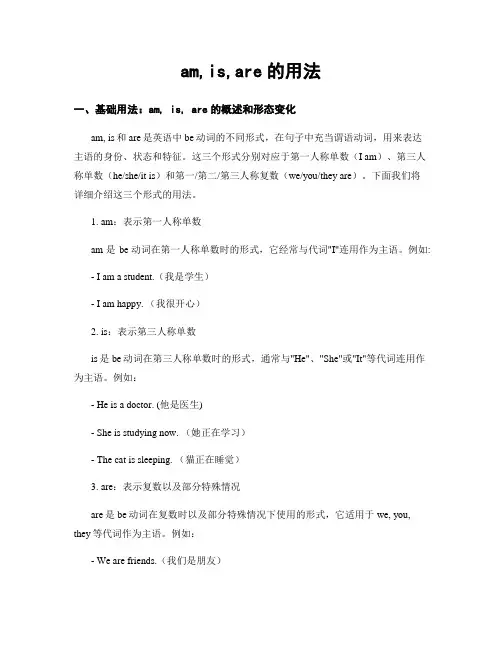
am,is,are的用法一、基础用法:am, is, are的概述和形态变化am, is和are是英语中be动词的不同形式,在句子中充当谓语动词,用来表达主语的身份、状态和特征。
这三个形式分别对应于第一人称单数(I am)、第三人称单数(he/she/it is)和第一/第二/第三人称复数(we/you/they are)。
下面我们将详细介绍这三个形式的用法。
1. am:表示第一人称单数am是be动词在第一人称单数时的形式,它经常与代词"I"连用作为主语。
例如:- I am a student.(我是学生)- I am happy. (我很开心)2. is:表示第三人称单数is是be动词在第三人称单数时的形式,通常与"He"、"She"或"It"等代词连用作为主语。
例如:- He is a doctor. (他是医生)- She is studying now. (她正在学习)- The cat is sleeping. (猫正在睡觉)3. are:表示复数以及部分特殊情况are是be动词在复数时以及部分特殊情况下使用的形式,它适用于we, you, they等代词作为主语。
例如:- We are friends.(我们是朋友)- You are smart. (你们很聪明)- The cars are parked outside. (车子停在外面)二、am, is, are的用法详解1. 表达身份或职业am, is和are常用来表达人或事物的身份、职业等方面。
例如:- He is a teacher.(他是一名教师)- They are students in the same class. (他们是同班的学生)这种形式通常出现在句子的谓语位置。
2. 表示状态、性质和特征am, is和are也可用于描述人或事物的状态、性质和特征。
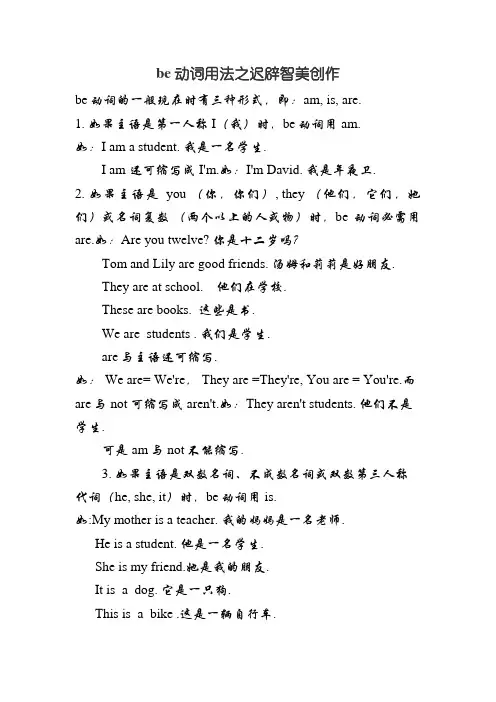
be动词用法之迟辟智美创作be动词的一般现在时有三种形式,即:am, is, are.1. 如果主语是第一人称I(我)时,be动词用am.如:I am a student. 我是一名学生.I am 还可缩写成I'm.如:I'm David. 我是年夜卫.2. 如果主语是you (你,你们), they (他们,它们,她们)或名词复数(两个以上的人或物)时,be动词必需用are.如:Are you twelve? 你是十二岁吗?Tom and Lily are good friends. 汤姆和莉莉是好朋友.They are at school.他们在学校.These are books. 这些是书.We are students . 我们是学生.are与主语还可缩写.如: We are= We're, They are =They're, You are = You're.而are与 not可缩写成aren't.如:They aren't students. 他们不是学生.可是am与not不能缩写.3. 如果主语是双数名词、不成数名词或双数第三人称代词(he, she, it)时,be动词用is.如:My mother is a teacher. 我的妈妈是一名老师.He is a student. 他是一名学生.She is my friend.她是我的朋友.It is a dog. 它是一只狗.This is a bike .这是一辆自行车.That is a cup . 那是一个杯子.is也可与主语缩写,如: He is = He's, My mother is = My mother's等.可是This is 不成缩写.而is与not可缩写成 isn't.如:This isn't a book. 这不是一本书.[解题过程]根据以上叙述我们可以把动词的用法以口诀的形式表述出来:我(I)是am,你(you)是are,剩下is留给她(she), 他(he), 它(it),两个以上都用are.be动词用法歌be动词真伟年夜,生出is, am, are.我用am,你用are,is连接他,她,它.双数名词用is,复数名词全用are.变疑问,往前提,句末问号莫抛弃.变否定,更容易,be后not莫忘记.疑问否定任你变,句首年夜写莫踌躇.1 用动词be (am, are, is)填空•I _____ a student.•Lucy and Lily ____ from USA.•---Who ___ they?•--- They ____ Jim, Mike and John.•The white shirts _____ on the chair.•Their bikes ____ under a big tree.•His father ___ at home.•How old _____ you?•______ there any birds in the tree?2 选择填空---What class ___ you in? --- I_____ in Class One.A are;areB are;amC are; isThey ____ new students. We ____ not new.A are ; areB are; amC are ; is---Where ____ his pencils? --- Oh, in his bag.A isB areC amMiss Gao _____ our teacher. She ____ tall.A are; areB are; isC is; isTheir classroom ______ over there.A areB isC amI think Ann and Betty _____ in the classroom.A isB amC areBe动词的用法及介绍“Be”动词的意思是”是”,它随人称的变动而变动.1. be动词属于系动词, 在句子中主要暗示为三种形式:am is、are.后面往往接形容词或名词做表语.如:(1)I’m young. (young形容词做表语)(2)He is a boy.( a boy名词做表语)含有be动词的句子在进行否定、疑问句变动时,都要在be 动词上变动.(1)酿成否定句:主语+be+ not+其他.即,直接在be后not.①I’m a Chinese boy.(酿成否定句)②You are good. (酿成否定句)③He is strict with us. (酿成否定句)④She is from America. (酿成否定句)以上四个句子中都含有am、 is或are,变否定句时,直接在am 、is、are后面加上not.即:①I’m not a Chinese boy.②You are not good.③He is not strict with us.④She is not from America.(2)酿成一般疑问句:Be+主语+其他?即把be动词提到主语的前面.注意:当肯定句主语为第一人称I和We时,变一般疑问句要酿成第二人称,be动词也要相应的酿成are.同样肯定句中的my和our 也要酿成your.①I am a boy. (酿成一般疑问句)→Are you a student?②We are good friends. (酿成一般疑问句)→Are you good friends?③She is from America. (酿成一般疑问句)→Is she from America?④He is strict with us. (酿成一般疑问句)→Is he strict with us?(3)变特殊疑问句:一般的要求为“对划线部份提问”,即用特殊疑问词取代划线的部份,后接省略划线部份的一般疑问句(一般不再呈现划线部份).如:①I’m well.(对划线部份提问)→How are you?②She is from America. (对划线部份提问)→Where is she from?。
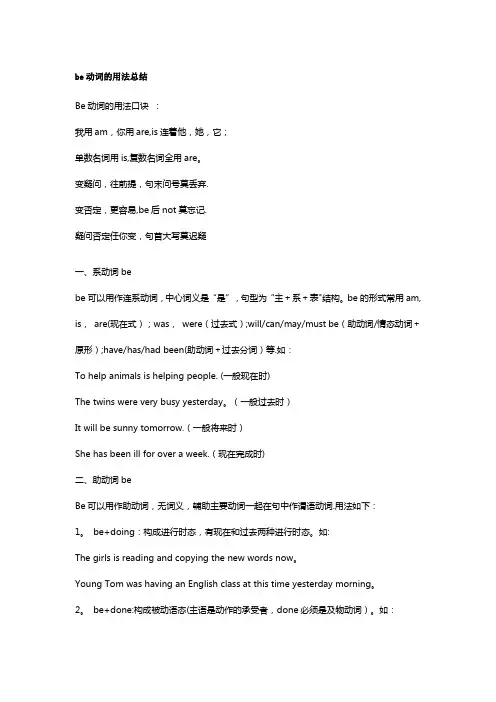
be动词的用法总结Be动词的用法口诀:我用am,你用are,is连着他,她,它;单数名词用is,复数名词全用are。
变疑问,往前提,句末问号莫丢弃.变否定,更容易,be后not莫忘记.疑问否定任你变,句首大写莫迟疑一、系动词bebe可以用作连系动词,中心词义是“是”,句型为“主+系+表"结构。
be的形式常用am, is,are(现在式);was,were(过去式);will/can/may/must be(助动词/情态动词+原形);have/has/had been(助动词+过去分词)等.如:To help animals is helping people. (一般现在时)The twins were very busy yesterday。
(一般过去时)It will be sunny tomorrow.(一般将来时)She has been ill for over a week.(现在完成时)二、助动词beBe可以用作助动词,无词义,辅助主要动词一起在句中作谓语动词.用法如下:1。
be+doing:构成进行时态,有现在和过去两种进行时态。
如:The girls is reading and copying the new words now。
Young Tom was having an English class at this time yesterday morning。
2。
be+done:构成被动语态(主语是动作的承受者,done必须是及物动词)。
如:Tea is grown in my hometown。
(一般现在时的被动语态)This building was built three years ago.(一般过去时的被动语态)Our classroom has been cleaned and tidied already.(现在完成时的被动语态)How could this kind of cakes be made in your home?(含情态动词的被动语态)That is a day never to be forgotten.(动词不定式的被动语态)3。
am is are的用法例句一、 "am is are" 的基本用法"am is are" 是英语中常见的动词be的形式,它们在句子中充当系动词的角色,用来描述主语的状态、身份或特征。
下面是一些例句,展示了"am is are" 的基本使用方式。
1. I am a teacher.(我是一名教师。
)这个句子中,am连接主语I和其所描述的身份teacher。
2. She is a student.(她是一名学生。
)这个句子中,is连接主语she和其所描述的身份student。
3. They are my friends.(他们是我的朋友。
)这个句子中,are连接主语they和其所描述的状态friends。
二、 "am is are" 的现在时态用法除了表示静态状态之外,"am is are" 还可以用来表示现在进行时态。
现在进行时态用于表达正在进行的动作或当前的情况。
以下是几个例句:1. We are studying English now.(我们正在学习英语。
)这里的are表示正在进行的动作,即学习英语。
2. He is working on a new project.(他正在从事一个新项目。
)is则表示目前他正在从事某个特定项目。
3. The children are playing in the park.(孩子们正在公园里玩耍。
)are表达孩子们当前正处于玩耍的状态。
三、 "am is are" 的一般疑问句和否定句用法"am is are" 也可以用于构成一般疑问句和否定句。
下面是一些例句:1. Are you coming to the party?(你要来参加派对吗?)这里are组成了一般疑问句,用来询问对方是否会出席派对。
2. Isn't she a talented musician?(她不是一个有才华的音乐家吗?)在这个例句中,isn't是is not的缩写形式,用来表达一种否定的观点。
系动词be的用法1.be的中心词义为“是”。
be的一般现在时有is,am,are三种形式。
2.句型:主语+be+表语表示主语是什么或是怎样的。
①主语,是单数的人/物或不可数名词,be的形式用is。
She is Deng Yaping.My name is Lily.②主语,是复数(两个或两个以上的人或物),be的形式用are。
They are from Canada.Tom and Jack are students(学生).③两个特殊:主语I,用am;主语you,用are。
I am Kangkang.You are Jane.3.否疑句式①否定句:主语+be+not+表语表示“主语不是......”。
须在be后加否定词not。
She is Maria.她是玛利亚。
(肯定句)She is not Maria.=She isn’t Maria.她不是玛利亚。
(否定句)(is not=isn’t) We are sisters.我们是姐妹。
We are not sisters.我们不是姐妹。
are not=aren’t②一般疑问句:be+主语+表语?询问“主语是......吗?”肯定回答:Yes,主语+be.否定回答:No,主语+be+not.She is Maria.Is she Maria?Yes,she is.No,she isn’t.They are Dingding and Nana.Are they Dingding and Nana?Yes,they are.No,they aren’t.解析:把be提到主语前,变为疑问句语序(倒装语序)。
英语入门须知1.首字母大写。
①英语句子第一个单词的第一个字母要大写。
②人名、国名、地名等专有名词的第一个字母要大写。
2.英语的句号是一个点。
顿号用逗号。
3.I(我)只有大写形式。
4.I am可缩写为I’m。
但I am位于句末时,不能缩写。
I am Jane.=I’m Jane.√Yes,I am.√Yes,I’m.×拓展:主系表句型1.be作系动词,其后接表语,构成系表结构,说明主语的性质、状态、特征等。
Be动词的用法归纳Be动词的用法归纳,你知道哪些?快来一起学习吧。
下面就和大家分享,来欣赏一下吧。
Be动词的用法归纳be是一个多功能动词,在初级英语里可见四种用法:功能一,系动词Bebe为连系动词,中心词义是是,句型为主+系+表结构。
be的形式常用am, is, are(现在式);was,were(过去式);will/can/may/must be(助动词/情态动词+原形);have/has/had been(助动词+过去分词)等。
如:To help animals is helping people.(一般现在时)The twins were very busy yesterday.(一般过去时)It will be sunny tomorrow.(一般将来时)She has been ill for over a week.(现在完成时)功能二,助动词Be助动词be,无词义,辅助主要动词一起在句中作谓语动词。
用法如下:1. be+doing:构成进行时态,有现在和过去两种进行时态。
如:The girls is reading and copying the new words now.Young Tom was always asking questions and trying out new ideas.2. be+done:构成被动语态(主语是动作的承受者,done必须是及物动词)。
如:Tea is grown in my hometown.(一般现在时的被动语态)This building was built three years ago.(一般过去时的被动语态)Our classroom has been cleaned and tidied already.(现在完成时的被动语态)How could this kind of cakes be made in your home?(含情态动词的被动语态)That is a day never to be forgotten.(动词不定式的被动语态)3. be+going to do,表示打算或将要做某事,be有现在和过去两种形式。
be动词的用法总结大家在英语学习的时候经常会对be动词的用法感到疑惑,下面小编给大家对be动词的用法做了总结,希望可以帮助到大家!英语中有哪些be动词有am 、is 、was are、were、 being。
1、am,is和are用于不同的人称和数。
am用于第一人称单数。
例如:I am a teacher.我是一名老师。
is用于第三人称单数,没有人和物的区别。
例如:—Who is he?—He is Tom’s father.—What’s this?—It is a book.are用于第二人称单、复数和第一、三人称的复数。
例如:You are a student. We are students, too.2、am,is和are可以帮助构成否定句和疑问句。
在am,is或are之后加上not,即将句子变成了否定句;把be动词提到句首,即将句子变成了疑问句。
例如:I’m from China. →I’m not from China. →Are you from China? (对I am的提问比较特别)He’s thirteen years old.→He isn’t thirteen years old.→Is he thirteen years old?They are policemen. →They aren’t policemen. →Are they policemen?看了以上例句,一定要注意am,is和are在句中的缩写形式。
另外,am,is,are与this,these,those在一起时一般不缩写。
3、be也可以位于句首,表示向别人提出要求。
例如: Be a good student! 做个好学生!be动词有哪些用法一、系动词be 作为系动词(也叫连系动词,link verb)的be,是英语学习者接触最早的用法,而且其用法也很多。
其基本含义为“是”,基本用法结构为“主语+be+表语”,也就是我们常说的主系表结构,其中的表语一般都由名词、形容词、数词或表地点、时间等的短语来充当。
are am is 的用法一、am, is, are的基本用法在英语中,助动词am, is和are是表示"be"动词的不同形式,分别对应于第一人称单数(am),第三人称单数(is),以及其他所有人称和数目的复数(are)。
它们在句子中起到了连系动词的作用,连接主语与表语。
下面将详细介绍这三个词的用法。
1. 第一人称单数(am)"am"是指第一人称单数(I),表示说话者自己。
例如:- I am a student.(我是学生。
)- I am happy today.(我今天很开心。
)2. 第三人称单数(is)"is"指代第三人称单数,即“他/她/它”。
例如:- She is my sister.(她是我的姐妹。
)- The cat is sleeping on the sofa.(那只猫睡在沙发上。
)3. 其他所有人称和数目的复数(are)"are"适用于其他所有人称和数目,包括我们、你们、他们等等。
例如:- We are going to the movies tonight.(我们今晚要去看电影。
)- You are my best friend.(你是我最好的朋友。
)二、am, is, are在不同句型中的运用1. 陈述句在陈述句中,am, is和are被用来连接主语和表语。
例如:- She is a doctor.(她是一名医生。
)- They are students.(他们是学生。
)2. 否定句在否定句中,将“not”插入到am, is或are之后,表示否定。
例如:- He is not coming to the party.(他不来参加派对。
)- We are not hungry.(我们不饿。
)3. 疑问句将am, is或are置于句子开头以构成疑问句。
例如:- Is she your sister?(她是你的姐妹吗?)- Are they ready for the exam?(他们准备好考试了吗?)4. 现在进行时am, is和are也用来构成现在进行时,表示目前正在进行的动作。
系动词Be(am, is, are)的用法一、am,is are 都属于be动词,be是他们的原型be动词的一般现在时有三种形式,即:am, is, are。
1、基本形式:am、are、is(1)、am第一人称I+am (注意:“I”无论何时都要大写,不管位于句首还是句中)例:I am a beautiful girl. I am twenty.I am 还可缩写成I'm。
如: I'm David. 我是大卫。
但是am与not不能缩写。
(2)、are第二人称you+are; 一人称复数we+are;三人称复数they+are 其他复数名词+are(注意:第二人称单复数同形,都为you)例:You are my good friend. We are in the same class.They are on the road. The books are on the desk.are与主语还可缩写。
如:We are= We're, They are =They're, You are = You're。
而are与 not可缩写成aren't。
(3)、is第三人称he(男) +is ; she(女)+is; it(不是人)+is;其他单数名词+is例:He\She is a good student. It is a white cat. A dog is on that street.is也可与主语缩写,如:He is = He's, My mother is = My mother's等。
但是This is不可缩写。
而is与not可缩写成 isn't。
如:This isn't a book. 这不是一本书。
二、请记住以下口诀:我用am,你用are,is连着他,她,它;单数名词用is,复数名词全用are。
变疑问,往前提,句末问号莫丢弃。
变否定,更容易,be后not莫忘记。
疑问否定任你变,句首Am,Is,Are大写莫迟疑,,句末问号莫忘加三、注:复数主语全用are。
指示代词作主语,This、that用is,These、those要用are。
回答一般疑问句,Yes,或No简回will/can/could/would/should/shall 等助动词后面加be其他时候,第一人称I后面用am 第二人称, 复数, 用are 单数用is...四、由连系动词am,is,are构成的句子:变一般疑问句时把am,is,are提到句子的前面,句尾用问号即可。
变否定句时直接在am,is,are后面加not即可。
例如:肯定句:He is a student. 一般疑问句: Is he a student?否定句: He is not a student.画线提问:对he提问: Who is a student? 对 a student 提问: What is he?另:特殊疑问句中:where\how\who\what\why+be动词+人称代词或名词?例:What is your name? My name is GaoBuHan.Where are you? I’m in the classroom.五、Be动词在一般过去时中的变化:be动词的一般现在时有两种种形式,即:was,were。
1.am 和is在一般过去时中变为was。
(was not = wasn’t)2.are在一般过去时中变为were。
(were not = weren’t)3.带有was或were的句子,其否定、疑问的变化和am,is, are一样,即否定句在was或were后加not,一般疑问句把was或were调到句首一、练习:用恰当的be动词填空。
1)I _____ a student. 2) You ____ a teacher.3)____she from Jinan? No, she ____. 4) _____you friends? No, we ____.5) He _____ in Class 4, Grade 1. 6) It_____ a car.7) They ____ cars. 8) ____ your mother in China?9) _____your friends in New York? 10) What ____her name?11) These _____ buses. 12) Those _____oranges.13) Where _____ her mother? 14) How old _____your teacher?15) What class _____ you in? 16)This ____ my brother.17)That ____ a pencil. 18)Mike and I____ students.19)____ there an apple on the table? Yes, there ____. 20)There____many books in the study.21)There____some ice cream in the fridge. 22)There____a pear and some cakes on the table.23)The children___ playing in the bedroom. 24)The rabbits___ eating grass.25)What___ your favorite subject? 26)The girl___ drawing. 27) "I"___ a letter(字母.) 28.The socks ______ on the desk.2二、用is, are填空1. There ______ a spoon on the plate.2. There ______ some milk on the table. There ______ coffee, too.3. There ______ some clouds in the sky. There ______ some boats on the river.4. There ______ some knives in the box.5. There ______ a newspaper in the living room.6. ______ there any books in the room? Yes, there ______ .______ there any magazines on the television? No, there ______ .7. There ______ a policeman in the kitchen.8. There ______ 60 minutes in an hour.9. There ______ a pencil, a ruler and 2 books on the desk.10. There ______ 2 glasses and a cup on the table.三、将下列句子改为否定句和一般疑问句,并做肯定或否定回答。
1. It was exciting.否定句:________________________________________________一般疑问句:____________________________________________肯、否定回答:__________________________________________2. All the students were very excited.否定句:________________________________________________一般疑问句:____________________________________________肯、否定回答:__________________________________________3. They are in his pocket.否定句:________________________________________________一般疑问句:____________________________________________肯、否定回答:__________________________________________4. There was a car in front of the house just now.否定句:________________________________________________一般疑问句:____________________________________________肯、否定回答:__________________________________________5、There are some peaches on the tree.否定句:________________________________________________一般疑问句:____________________________________________肯、否定回答:__________________________________________6 .The boy is drawing in the art room.否定句:________________________________________________一般疑问句:____________________________________________肯、否定回答:__________________________________________4。